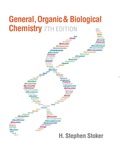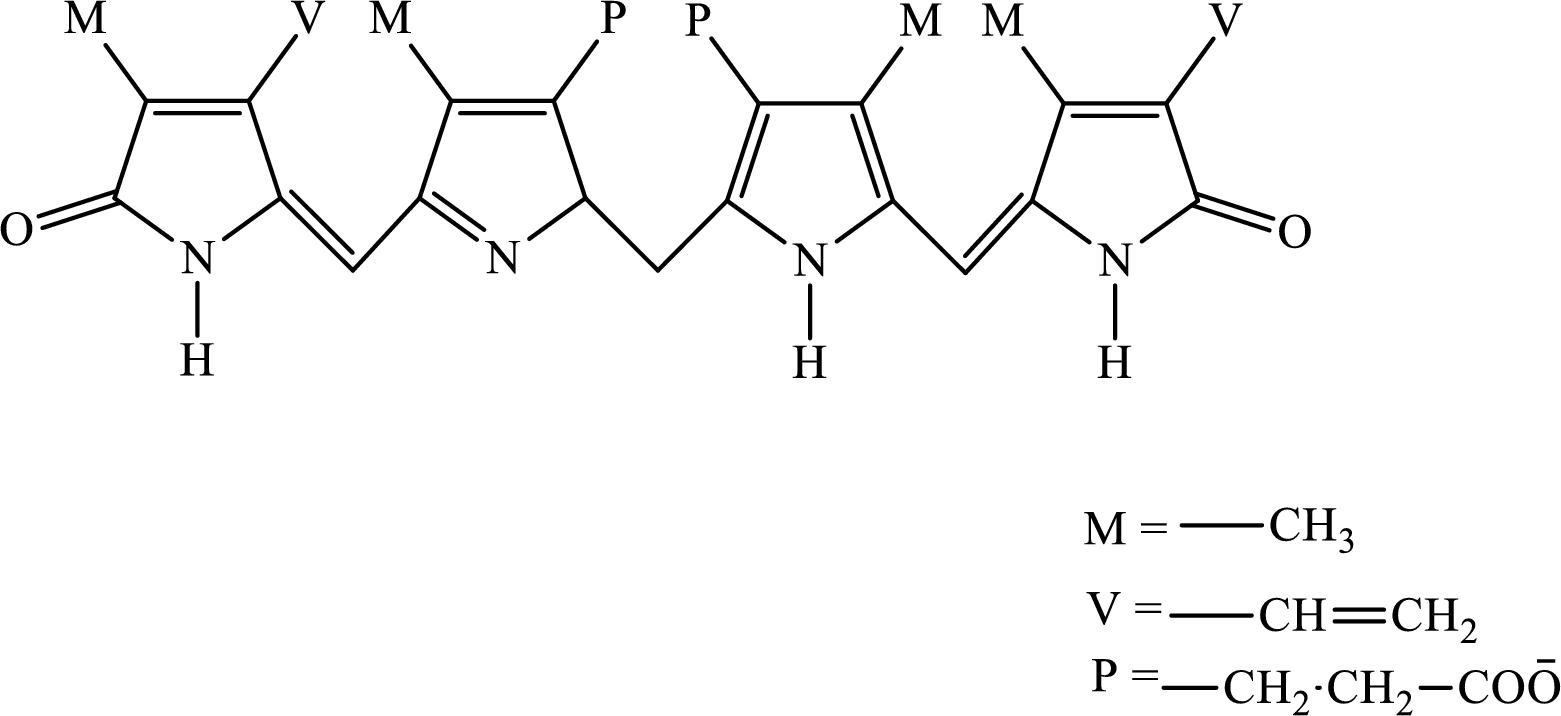
EBK GENERAL, ORGANIC, AND BIOLOGICAL CH
7th Edition
ISBN: 8220100853180
Author: STOKER
Publisher: CENGAGE L
expand_more
expand_more
format_list_bulleted
Concept explainers
Question
Chapter 26, Problem 26.100EP
Interpretation Introduction
Interpretation: To determine the physical condition that causes jaundice.
Concept introduction: Jaundice is a condition in which the concentration of bilirubin in the blood becomes higher than the normal and is caused due to an imbalance between the degradation of heme to form bilirubin and removal of bilirubin from the body by the liver.
Bilirubin is the second step degradation product of heme portion of hemoglobin. It is reddish orange in color and is a tetrapyrrolic bile pigment. The structure of bilirubin is:

Expert Solution & Answer
Want to see the full answer?
Check out a sample textbook solution
Students have asked these similar questions
Steps and explanation
Steps and explanations please.
Steps on how to solve. Thank you!
Chapter 26 Solutions
EBK GENERAL, ORGANIC, AND BIOLOGICAL CH
Ch. 26.1 - Which of the following statements about dietary...Ch. 26.1 - Dietary protein materials as they leave the...Ch. 26.1 - The inactive form of pepsin is converted to its...Ch. 26.1 - Which of the following is not a proteolytic...Ch. 26.2 - The dominant use for the amino acids of the amino...Ch. 26.2 - The most abundant amino acid in the amino acid...Ch. 26.2 - Prob. 3QQCh. 26.3 - Prob. 1QQCh. 26.3 - Prob. 2QQCh. 26.3 - The net effect of transamination is to collect the...
Ch. 26.3 - Prob. 4QQCh. 26.3 - Prob. 5QQCh. 26.3 - Most aminotransferases are specific for the keto...Ch. 26.4 - Which of the following statements concerning the...Ch. 26.4 - Prob. 2QQCh. 26.4 - The two fuels for the urea cycle are a. carbamoyl...Ch. 26.4 - Prob. 4QQCh. 26.4 - Prob. 5QQCh. 26.4 - Prob. 6QQCh. 26.5 - Which of the following statements concerning the...Ch. 26.5 - Prob. 2QQCh. 26.5 - Prob. 3QQCh. 26.5 - Prob. 4QQCh. 26.6 - Prob. 1QQCh. 26.6 - How many of the standard amino acids are...Ch. 26.6 - The simplest pathways for amino acid biosynthesis...Ch. 26.7 - Prob. 1QQCh. 26.7 - Which of the following statements concerning the...Ch. 26.7 - Prob. 3QQCh. 26.7 - In the degradation of heme, the iron atom present...Ch. 26.8 - In degradation of the sulfur-containing amino acid...Ch. 26.8 - Prob. 2QQCh. 26.8 - Prob. 3QQCh. 26.8 - Prob. 4QQCh. 26.9 - Prob. 1QQCh. 26.9 - Prob. 2QQCh. 26.9 - Prob. 3QQCh. 26.10 - Prob. 1QQCh. 26.10 - Prob. 2QQCh. 26.10 - Prob. 3QQCh. 26 - Prob. 26.1EPCh. 26 - Indicate whether each of the following aspects of...Ch. 26 - Indicate whether each of the following pairings of...Ch. 26 - Indicate whether each of the following pairings of...Ch. 26 - Indicate whether each of the following statements...Ch. 26 - Prob. 26.6EPCh. 26 - Prob. 26.7EPCh. 26 - Prob. 26.8EPCh. 26 - Prob. 26.9EPCh. 26 - Prob. 26.10EPCh. 26 - Prob. 26.11EPCh. 26 - Prob. 26.12EPCh. 26 - Prob. 26.13EPCh. 26 - Prob. 26.14EPCh. 26 - Indicate whether each of the following situations...Ch. 26 - Indicate whether each of the following situations...Ch. 26 - Prob. 26.17EPCh. 26 - Prob. 26.18EPCh. 26 - Prob. 26.19EPCh. 26 - Prob. 26.20EPCh. 26 - Prob. 26.21EPCh. 26 - Prob. 26.22EPCh. 26 - Prob. 26.23EPCh. 26 - Prob. 26.24EPCh. 26 - Prob. 26.25EPCh. 26 - Prob. 26.26EPCh. 26 - Prob. 26.27EPCh. 26 - Prob. 26.28EPCh. 26 - Prob. 26.29EPCh. 26 - Prob. 26.30EPCh. 26 - Prob. 26.31EPCh. 26 - Prob. 26.32EPCh. 26 - Prob. 26.33EPCh. 26 - Prob. 26.34EPCh. 26 - Prob. 26.35EPCh. 26 - Prob. 26.36EPCh. 26 - Prob. 26.37EPCh. 26 - Prob. 26.38EPCh. 26 - Prob. 26.39EPCh. 26 - Prob. 26.40EPCh. 26 - Prob. 26.41EPCh. 26 - Prob. 26.42EPCh. 26 - Prob. 26.43EPCh. 26 - Draw the structure of the -keto acid produced from...Ch. 26 - Prob. 26.45EPCh. 26 - Prob. 26.46EPCh. 26 - Prob. 26.47EPCh. 26 - Prob. 26.48EPCh. 26 - Prob. 26.49EPCh. 26 - Prob. 26.50EPCh. 26 - Prob. 26.51EPCh. 26 - Prob. 26.52EPCh. 26 - Prob. 26.53EPCh. 26 - Prob. 26.54EPCh. 26 - Prob. 26.55EPCh. 26 - Prob. 26.56EPCh. 26 - Prob. 26.57EPCh. 26 - Prob. 26.58EPCh. 26 - Prob. 26.59EPCh. 26 - Prob. 26.60EPCh. 26 - Prob. 26.61EPCh. 26 - Prob. 26.62EPCh. 26 - Prob. 26.63EPCh. 26 - Prob. 26.64EPCh. 26 - Prob. 26.65EPCh. 26 - Prob. 26.66EPCh. 26 - Prob. 26.67EPCh. 26 - Prob. 26.68EPCh. 26 - Prob. 26.69EPCh. 26 - Prob. 26.70EPCh. 26 - Prob. 26.71EPCh. 26 - Prob. 26.72EPCh. 26 - Prob. 26.73EPCh. 26 - Prob. 26.74EPCh. 26 - Prob. 26.75EPCh. 26 - Prob. 26.76EPCh. 26 - Prob. 26.77EPCh. 26 - Prob. 26.78EPCh. 26 - Prob. 26.79EPCh. 26 - Prob. 26.80EPCh. 26 - Prob. 26.81EPCh. 26 - Prob. 26.82EPCh. 26 - Prob. 26.83EPCh. 26 - Prob. 26.84EPCh. 26 - Prob. 26.85EPCh. 26 - Prob. 26.86EPCh. 26 - Prob. 26.87EPCh. 26 - Prob. 26.88EPCh. 26 - Prob. 26.89EPCh. 26 - Prob. 26.90EPCh. 26 - Prob. 26.91EPCh. 26 - Prob. 26.92EPCh. 26 - Prob. 26.93EPCh. 26 - Prob. 26.94EPCh. 26 - Prob. 26.95EPCh. 26 - Prob. 26.96EPCh. 26 - Prob. 26.97EPCh. 26 - Which bile pigment is responsible for the...Ch. 26 - Prob. 26.99EPCh. 26 - Prob. 26.100EPCh. 26 - Prob. 26.101EPCh. 26 - Prob. 26.102EPCh. 26 - Prob. 26.103EPCh. 26 - Prob. 26.104EPCh. 26 - Prob. 26.105EPCh. 26 - Prob. 26.106EPCh. 26 - Prob. 26.107EPCh. 26 - Prob. 26.108EPCh. 26 - Prob. 26.109EPCh. 26 - Prob. 26.110EPCh. 26 - Prob. 26.111EPCh. 26 - Prob. 26.112EPCh. 26 - Prob. 26.113EPCh. 26 - Prob. 26.114EPCh. 26 - Prob. 26.115EPCh. 26 - Prob. 26.116EP
Knowledge Booster
Learn more about
Need a deep-dive on the concept behind this application? Look no further. Learn more about this topic, biology and related others by exploring similar questions and additional content below.Similar questions
- 3. Name this ether correctly. H₁C H3C CH3 CH3 4. Show the best way to make the ether in #3 by a Williamson Ether Synthesis. Start from an alcohol or phenol. 5. Draw the structure of an example of a sulfide.arrow_forward1. Which one(s) of these can be oxidized with CrO3 ? (could be more than one) a) triphenylmethanol b) 2-pentanol c) Ethyl alcohol d) CH3 2. Write in all the product(s) of this reaction. Label them as "major" or "minor". 2-methyl-2-hexanol H2SO4, heatarrow_forward3) Determine if the pairs are constitutional isomers, enantiomers, diastereomers, or mesocompounds. (4 points)arrow_forward
- In the decomposition reaction in solution B → C, only species C absorbs UV radiation, but neither B nor the solvent absorbs. If we call At the absorbance measured at any time, A0 the absorbance at the beginning of the reaction, and A∞ the absorbance at the end of the reaction, which of the expressions is valid? We assume that Beer's law is fulfilled.arrow_forward> You are trying to decide if there is a single reagent you can add that will make the following synthesis possible without any other major side products: 1. ☑ CI 2. H3O+ O Draw the missing reagent X you think will make this synthesis work in the drawing area below. If there is no reagent that will make your desired product in good yield or without complications, just check the box under the drawing area and leave it blank. Click and drag to start drawing a structure. Explanation Check ? DO 18 Ar B © 2025 McGraw Hill LLC. All Rights Reserved. Terms of Use | Privacy Center | Accessibilityarrow_forwardDon't use ai to answer I will report you answerarrow_forward
- Consider a solution of 0.00304 moles of 4-nitrobenzoic acid (pKa = 3.442) dissolved in 25 mL water and titrated with 0.0991 M NaOH. Calculate the pH at the equivalence pointarrow_forwardWhat is the name of the following compound? SiMe3arrow_forwardK Draw the starting structure that would lead to the major product shown under the provided conditions. Drawing 1. NaNH2 2. PhCH2Br 4 57°F Sunny Q Searcharrow_forward
- 7 Draw the starting alkyl bromide that would produce this alkyne under these conditions. F Drawing 1. NaNH2, A 2. H3O+ £ 4 Temps to rise Tomorrow Q Search H2arrow_forward7 Comment on the general features of the predicted (extremely simplified) ¹H- NMR spectrum of lycopene that is provided below. 00 6 57 PPM 3 2 1 0arrow_forwardIndicate the compound formula: dimethyl iodide (propyl) sulfonium.arrow_forward
arrow_back_ios
SEE MORE QUESTIONS
arrow_forward_ios
Recommended textbooks for you
 General, Organic, and Biological ChemistryChemistryISBN:9781285853918Author:H. Stephen StokerPublisher:Cengage Learning
General, Organic, and Biological ChemistryChemistryISBN:9781285853918Author:H. Stephen StokerPublisher:Cengage Learning Organic And Biological ChemistryChemistryISBN:9781305081079Author:STOKER, H. Stephen (howard Stephen)Publisher:Cengage Learning,
Organic And Biological ChemistryChemistryISBN:9781305081079Author:STOKER, H. Stephen (howard Stephen)Publisher:Cengage Learning, Chemistry for Today: General, Organic, and Bioche...ChemistryISBN:9781305960060Author:Spencer L. Seager, Michael R. Slabaugh, Maren S. HansenPublisher:Cengage Learning
Chemistry for Today: General, Organic, and Bioche...ChemistryISBN:9781305960060Author:Spencer L. Seager, Michael R. Slabaugh, Maren S. HansenPublisher:Cengage Learning Introduction to General, Organic and BiochemistryChemistryISBN:9781285869759Author:Frederick A. Bettelheim, William H. Brown, Mary K. Campbell, Shawn O. Farrell, Omar TorresPublisher:Cengage Learning
Introduction to General, Organic and BiochemistryChemistryISBN:9781285869759Author:Frederick A. Bettelheim, William H. Brown, Mary K. Campbell, Shawn O. Farrell, Omar TorresPublisher:Cengage Learning

General, Organic, and Biological Chemistry
Chemistry
ISBN:9781285853918
Author:H. Stephen Stoker
Publisher:Cengage Learning

Organic And Biological Chemistry
Chemistry
ISBN:9781305081079
Author:STOKER, H. Stephen (howard Stephen)
Publisher:Cengage Learning,

Chemistry for Today: General, Organic, and Bioche...
Chemistry
ISBN:9781305960060
Author:Spencer L. Seager, Michael R. Slabaugh, Maren S. Hansen
Publisher:Cengage Learning

Introduction to General, Organic and Biochemistry
Chemistry
ISBN:9781285869759
Author:Frederick A. Bettelheim, William H. Brown, Mary K. Campbell, Shawn O. Farrell, Omar Torres
Publisher:Cengage Learning

DIGESTER-35 | VITAMINS AND THEIR RELATED COENZYMES| GPAT | NIPER | PHARMACIST| DI; Author: GPAT DISCUSSION CENTER;https://www.youtube.com/watch?v=CGrdNYmho0s;License: Standard YouTube License, CC-BY